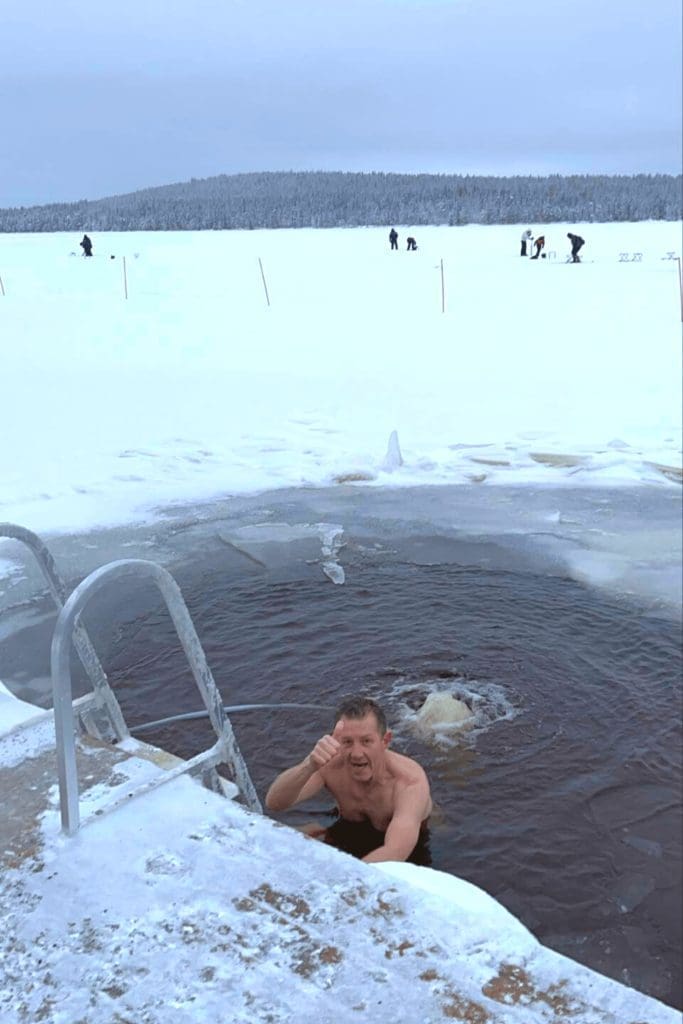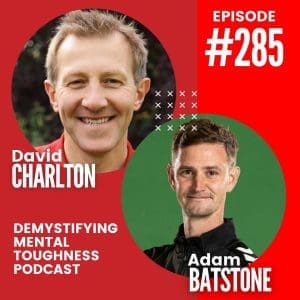16 December 2023

Helping You Gain A Mental Edge
How To Help Athletes And Sport Coaches Make Better Decisions
You may have picked up on the fact you did not receive a Mental Edge newsletter last Saturday, this was because I was having a lot of fun in Lapland with my family on a trip of a lifetime where we had a great time with Santa Claus, elf’s, reindeers and huskies. I also thought I share with you my latest adventure into cold water! The water was actually warm around 2 degrees in comparison to the air temperature, minus of 15 degrees. Boy did my face feel it when I was blasted by cold air when taking the dip.

Why? Why did I put myself through it. One reason was I didn’t have a sense of fear about doing so, I was actually excited about the thought of trying it – after all is was day 301 of consecutive dips into cold water.
On reflection, and something I’ve thought a lot about recently is, this obsession has really helped me get comfortable with being uncomfortable. It’s helped me in my life, work and sport hugely and shaped my decision making. It’s very easy to put up conscious or unconscious barriers and by challenging myself every day I’m beginning to appreciate how much we can get in our own way. This informs this mental edge where we look at how you can become a better decision maker.
Decision making in sport is crucial for optimal performance whether you are a coach or an athlete. Ideally you want to be able to make decisions, on the fly, automatically with a sense of calmness and trust if you’re an athlete. Whereas, for coaches, being able to make rational decisions not letting emotion get in the way is a skill. However, to many, internal and external pressures can have a big impact on decision making.
9 common challenges that can go on to influence decision making:
- Nerves, fear or anxiety.
- Your perception of the task in front of you.
- Worrying about what other people think / pressure from others.
- Being too excited or over-confident.
- Past experiences.
- Future contract, money or career concerns.
- Fatigue.
- Intimidation or self-intimidation.
- Paralysis by analysis or over-thinking.
Now we’ll dissect the top 3 challenges and offer some tips, starting with nerves, fear and anxiety. Being aware of how activated you are is something that will help you. Rather than telling yourself “I’m really nervous I’ll never perform” and catastrophising about your situation,you could look to rate on a scale of 1-10 how nervous you are. If it was a “7” where you rated yourself I’d like to think this can shift your perspective and you can then think about how you can lower the 7, perhaps to a 5. If you’re able to do so, this may be the difference between you freezing and feeling petrified to recognising that it is normal to feel uncomfortable before you go out to compete.
One way to help yourself is to find ways to regulate your breathing as my latest guest Anna Parker-Naples talks about in the most recent Demystifying Mental Toughness Podcast.
Secondly, many athletes perception of the task in front of them can really throw them off. Take the right footed left winger in football who is marked cleverly and tightly by the full back, who keeps showing the winger on to their left foot. The winger then becomes fearful and perhaps disinterested, they retreat into their shell and their effort level drops.
A relatively new method to overcome this type of challenge is to work with a coach who has an awareness and skillset in cognitive training. Some one like Felix Lehmann, another recent guest of the Demystifying Mental Toughness Podcast. Felix has an expertise in helping individual players and athletes across many sports to overcome challenges like this one. In football or soccer, Felix specialises in helping players improve 3 main elements; authentic two-footedness, game intelligence and creativity. Enjoy tuning in as he discusses how he goes about his work.
Lastly, as a coach you may be under a lot of stress and pressure from owners or club directors, as well as a fan base, players and other people. This can severely impair some coaches decision making especially in environments where there is a lot of conflict and difficult conversations need to take place. This is where Nicole Posner’s words of wisdom come in useful, as she helps you understand the psychology behind difficult conversations and why we often avoid them. She discusses what creates and drives conflict and offers some tools to better deal with conflict.
BLOGS TO HELP YOU IMPROVE YOU OR YOUR KIDS DECISION MAKING
Many children can get very fearful and uptight before they play competitively. So much so that they dread playing, they may be very irritable with you the parent on the journey in the car, they may even be sick or in some cases they refuse to play. Faking injury is also something I’ve come across a number of times.
In this blog, I share some ideas on how to support youngsters who experience these types of feelings which go on to severely impair their decision making.
Your personal core values are the things that you believe are IMPORTANT in your life. Personal core values can exist at home, at work, in your sport or any area of your life. They should determine your priorities. You should also be able to measure closely if you are sticking to your values or if any conflicts are influencing your actions. Read on to discover your own core values to put you in a position to shape the decisions that you make in your life and in your sport and understand what is REALLY IMPORTANT to you.
OTHER HELPFUL RESOURCES TO CHECK OUT
The Sports Psych Show with Dr Michael Ashford – Decision Making Processes in Team Sports
The Coaching Discourse Podcast with Ceriann Davies & Mike Ashford – Decision Making
The Sports Psychology Podcast with Patrick Cohn – How to Improve Decision Making when Competing
SPORT SPECIFIC RESOURCES FROM OUR SPORTS PSYCHOLOGY LIBRARY TO HELP YOU
Soccer or Football Psychology Resources
BUILD YOUR RESILIENCE LEVELS IF YOU PLAY FOOTBALL OR SOCCER
We’ve recently started a regular newsletter with tips and tricks for those interested in the psychology of football or soccer. Feel free to sign up today.
3 WAYS TO LEARN MORE ABOUT OUR WORK:

Best Wishes
David Charlton
Online Sports Psychologist | Mental Performance Coach who supports many highly motivated athletes, young and old, developing their skills or who are already highly skilled so that they gain a mental edge and get the most from their talent across the globe from USA/Canada to Great Britain and Ireland to UAE, South Africa, Australia and New Zealand, using ONLINE Video Conferencing.
Managing Director – Inspiring Sporting Excellence
Host of Demystifying Mental Toughness Podcast
Founder of The Sports Psychology Hub
Author of The Mental Edge
With over a decades’ experience supporting athletes, coaches, parents and teams to transfer their skills from training to competitive situations, under pressure.
T: +44 7734 697769







